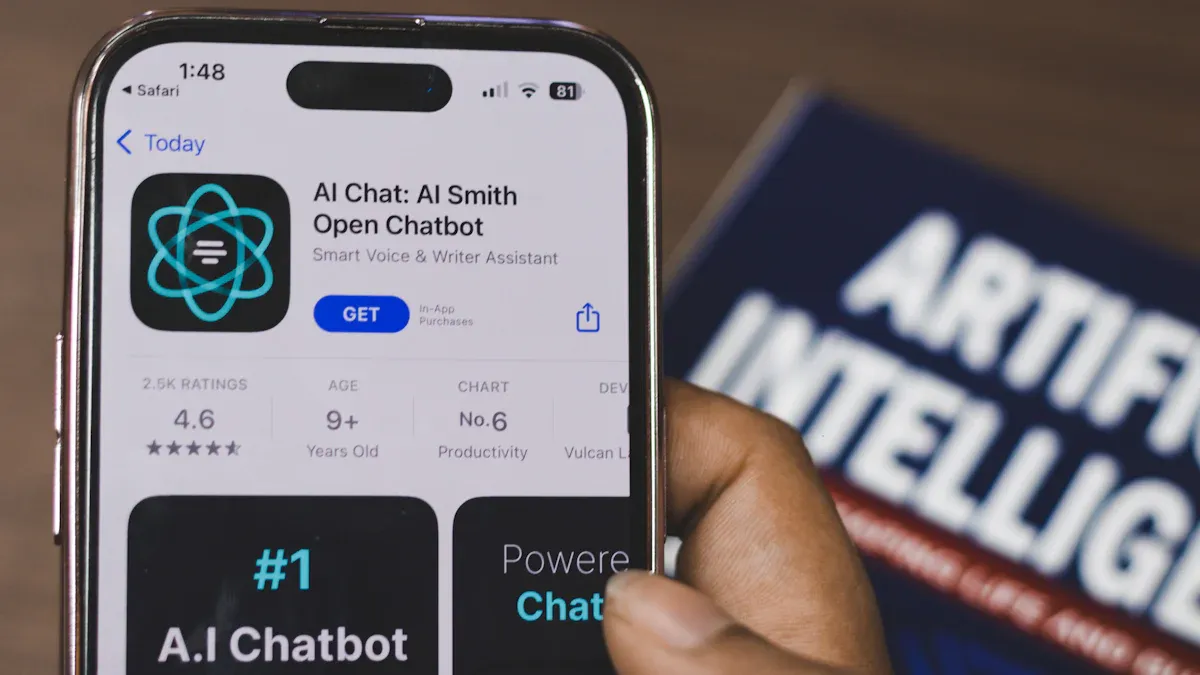The Importance of Chatbots in Modern Hiring Practices

Recruitment chatbots are transforming how you approach hiring. They automate repetitive tasks, saving you time and resources while ensuring a smoother process. For instance, companies like L’Oréal have reduced recruitment durations by 50% using AI chatbots, offering faster responses and clearer guidance to candidates. These tools also enhance the candidate experience. Studies show that 70% of organizations using chatbots report quicker hiring times, and 81% of candidates welcome AI-powered assistants for faster processes. By adopting a chatbot for hiring, you can create a fairer, more efficient, and engaging recruitment journey.
Key Takeaways
Chatbots handle 90% of repeated hiring tasks, saving time. This lets HR teams work on more important activities.
Using chatbots can cut hiring time by half. This helps you hire great candidates faster than others.
Chatbots make the hiring process better by giving quick help. They also offer personal interactions to candidates.
Adding chatbots to HR systems makes work easier and faster. It also improves communication during hiring.
Using chatbots shows your company is modern and smart. This attracts different talents and boosts your company’s image.
Understanding Recruitment Chatbots

What Is a Chatbot for Hiring?
A chatbot for hiring is an AI-powered tool designed to simplify and enhance the recruitment process. It automates tasks like screening resumes, scheduling interviews, and answering candidate queries. These chatbots use advanced natural language processing (NLP) to interact with candidates in real time, providing instant responses and personalized assistance. By integrating with Applicant Tracking Systems (ATS), they deliver data-driven insights that help you make better hiring decisions.
In recent years, chatbots have become essential in modern recruitment strategies. They are no longer optional tools but critical components that improve efficiency and engagement. For example, chatbots can conduct initial assessments by asking targeted questions, ensuring only qualified candidates move forward. This approach not only saves time but also reduces biases, focusing solely on skills and qualifications.
Key Benefits of Recruitment Chatbots
Automating Repetitive Tasks
Recruitment involves many repetitive tasks, such as filtering resumes and sending updates. Chatbots can automate up to 90% of these tasks, freeing up your time to focus on strategic activities. They can also manage referral programs, track referrals, and remind employees to participate, increasing referral rates. This level of automation ensures a smoother and faster hiring process.
Enhancing the Candidate Experience
Candidates often abandon applications due to lengthy or unclear processes. Chatbots address this issue by providing instant communication and real-time support. They answer questions 24/7, guide candidates through the application process, and even assist with onboarding. This personalized interaction enhances the overall candidate experience, making your company more attractive to top talent.
Reducing Time-to-Hire
Time is critical in recruitment. Chatbots speed up the process by automating initial screenings and scheduling interviews. They eliminate the back-and-forth communication that often delays hiring decisions. Studies show that companies using chatbots can reduce recruitment durations by up to 50%, allowing you to secure top candidates before your competitors.
Improving Cost Efficiency
Hiring can be expensive, but chatbots help you cut costs significantly. By automating tasks and improving efficiency, they reduce the need for additional HR resources. Companies with strong employer brands have reported a 43% decrease in cost per hire when using chatbots. This makes them a cost-effective solution for modern recruitment challenges.
Tip: Adopting a chatbot for hiring not only saves time and money but also positions your company as a forward-thinking employer.
Practical Applications in Modern Recruitment
Screening and Shortlisting Candidates
Automating Initial Qualification Checks
Chatbots revolutionize the way you handle candidate screening. By automating initial qualification checks, they save you countless hours. These AI-powered tools evaluate resumes and applications against predefined criteria, ensuring only the most suitable candidates move forward. This process eliminates manual errors and speeds up decision-making. For example, chatbots can ask targeted questions to assess skills and qualifications, ensuring a fair and unbiased approach. According to recent data, 44% of recruiters believe AI will replace manual screening, highlighting the growing reliance on automation in recruitment.
Identifying Top Talent Efficiently
Finding top talent has never been easier. Chatbots analyze candidate responses and match them with job requirements, identifying high-potential individuals quickly. This efficiency allows you to focus on engaging with the best candidates rather than sifting through hundreds of applications. Companies like Mastercard have seen remarkable results, with a 900% increase in candidate profiles and an 11% rise in conversion rates. These metrics prove that chatbots are indispensable for modern recruitment strategies.
Scheduling and Coordinating Interviews
Streamlining Interview Processes
Interview scheduling can be a logistical nightmare, but chatbots simplify this task. They coordinate with candidates and hiring managers to find mutually convenient times, eliminating the need for back-and-forth communication. This automation not only saves time but also enhances the overall recruitment experience. In fact, 90% of high-volume hiring tasks, including interview scheduling, can now be automated with conversational AI.
Reducing Back-and-Forth Communication
Chatbots reduce the frustration of endless email exchanges. They provide instant updates and confirmations, ensuring a seamless scheduling process. This efficiency leads to significant time and cost savings, benefiting both employers and candidates. By streamlining these tasks, chatbots allow you to focus on building meaningful connections with top talent.
Providing Real-Time Support
Answering Candidate Questions 24/7
Candidates often have questions about job roles, application statuses, or company policies. Chatbots offer real-time support by providing instant answers, regardless of the time of day. This availability ensures that candidates feel valued and informed throughout the recruitment process. Unilever, for instance, implemented AI-driven chatbots and achieved a 30% reduction in application process time while improving candidate engagement.
Enhancing the Overall Candidate Experience
A positive candidate experience is crucial for attracting top talent. Chatbots enhance this experience by offering personalized interactions and guidance. They assist candidates at every stage, from application to onboarding, creating a seamless journey. Companies like Hilton have reported a 30% increase in candidate engagement rates after integrating chatbots into their recruitment processes. This demonstrates the transformative impact of real-time support on candidate satisfaction.
The Future of Recruitment with Chatbots

Predictive Analytics in Hiring
Forecasting Hiring Trends
Chatbots are shaping the future of modern recruitment by leveraging predictive analytics. These tools analyze historical hiring data to forecast trends, helping you stay ahead in the competitive hiring process. For example, healthcare organizations use predictive models to anticipate staffing needs based on patient growth trends. This proactive approach ensures you always have the right talent at the right time. Similarly, advertising agencies analyze past campaign data to identify traits that correlate with high-performing creative roles. By adopting predictive analytics, you can make smarter hiring decisions and reduce turnover.
Identifying High-Potential Candidates
Predictive analytics also helps you identify high-potential candidates with precision. Chatbots assess candidate profiles, skills, and career aspirations to predict their success in specific roles. This reduces the risk of bad hires and ensures you invest in the right talent. Advanced AI chatbots streamline this process, offering greater efficiency and accuracy. As these tools become more sophisticated, they will play an even bigger role in modern recruitment strategies.
Personalizing the Candidate Experience
Tailored Job Recommendations
Job seekers expect personalized experiences during the hiring process. Chatbots deliver this by analyzing candidate preferences and behavior to provide tailored job recommendations. AI algorithms consider not just skills but also career goals, ensuring better job placements. For instance, a chatbot might suggest roles that align with a candidate’s aspirations, increasing their satisfaction and engagement. This level of personalization makes your recruitment process more appealing to top talent.
Customized Career Guidance
Beyond job recommendations, chatbots offer customized career guidance. They provide insights into potential career paths, helping job seekers make informed decisions. This guidance enhances the candidate experience and positions your company as a supportive employer. Statistics show that 80% of candidates value regular updates during the application process, highlighting the importance of communication. By integrating chatbots, you can meet these expectations and improve your employer brand.
Integrating Chatbots with HR Technologies
Collaboration with ATS and CRM Systems
Integrating chatbots with Applicant Tracking Systems (ATS) and Customer Relationship Management (CRM) platforms transforms the hiring process. Chatbots automatically update candidate profiles, track applications, and organize data, saving you time and effort. CRM integration allows for personalized updates, improving candidate engagement. This seamless collaboration enhances efficiency and ensures a smoother recruitment journey.
Enhancing Recruitment Strategies
When chatbots complement existing HR technologies, they elevate your recruitment strategies. These tools automate time-consuming tasks, allowing you to focus on identifying the most qualified candidates. For example, chatbots can handle initial screenings, schedule interviews, and provide real-time support. This integration not only streamlines the hiring process but also improves the overall candidate experience. By adopting chatbots, you can stay competitive in the ever-evolving world of modern recruitment.
Overcoming Challenges in Chatbot Implementation
Addressing Common Concerns
Ensuring Data Privacy and Security
When implementing chatbots in recruitment, data privacy is one of the most critical concerns. These tools handle sensitive candidate information, such as resumes, contact details, and even personal preferences. Without robust security measures, this data could be at risk of breaches or misuse. Ethical dilemmas, including fairness and non-discrimination, also arise when chatbots use automated decision-making algorithms. A study of 480 young users engaging with AI chatbots revealed that emotional factors often drive privacy decisions. Despite being aware of risks, users still disclose personal information based on positive experiences. To address these challenges, you must ensure your chatbot complies with data protection regulations and uses encryption to safeguard candidate data.
Avoiding Impersonal Interactions
Candidates value a personal connection during the hiring process. However, traditional chatbots often fail to deliver this, leading to robotic and impersonal interactions. This lack of human touch can harm your employer brand and discourage top talent from applying. To overcome this, focus on chatbots that use advanced natural language processing (NLP) to simulate human-like conversations. For example, chatbots can personalize responses based on a candidate's profile, creating a more engaging experience. By prioritizing empathy and personalization, you can ensure your chatbot enhances, rather than detracts from, the recruitment journey.
Best Practices for Success
Selecting the Right Chatbot Platform
Choosing the right chatbot platform is essential for successful implementation. Start by assessing your specific needs. Are you looking to automate candidate screening, improve communication, or both? Once you identify your goals, prioritize platforms that offer AI-driven conversations, seamless integration with HR systems, and 24/7 availability. These features ensure your chatbot can handle high volumes of recruitment tasks efficiently. Smaller organizations should also consider platforms with scalable pricing models to avoid high resource investments. By selecting a platform tailored to your needs, you can maximize the benefits of chatbots in recruitment.
Monitoring and Optimizing Chatbot Performance
A chatbot's effectiveness depends on continuous monitoring and optimization. Without regular updates, it may generate inaccurate responses or fail to adapt to changing recruitment needs. For instance, AI-powered chatbots can sometimes "hallucinate," providing fabricated answers that damage trust. To prevent this, you should track performance metrics like response accuracy, candidate satisfaction, and task completion rates. Use this data to refine your chatbot's algorithms and improve its functionality. Regular optimization not only keeps your chatbot relevant but also ensures it continues to enhance your recruitment strategy.
Tip: Regularly test your chatbot with real candidates to identify areas for improvement and maintain a high-quality user experience.
Recruitment chatbots are transforming how you hire by automating tasks and improving the candidate experience. They streamline processes, reduce costs, and help you make informed hiring decisions. For example, these tools eliminate biases, optimize communication, and enhance employer branding.
Benefit | Description |
|---|---|
Reducing Biases | Eliminates unconscious biases in hiring, focusing on skills and qualifications instead. |
Optimizing Communication | Streamlines communication with candidates, enhancing the overall experience. |
Improving Efficiency | Saves time and costs in the recruitment lifecycle by automating tasks. |
Enhancing Employer Branding | Attracts a diverse talent pool, improving the company's image and compliance with diversity standards. |
Streamlining Recruitment Process | Acts as a gatekeeper, ensuring only qualified candidates progress, thus improving recruitment efficiency. |
By adopting chatbots, you can stay competitive and attract top talent in today’s evolving recruitment landscape.
Tip: Recruitment chatbots lead to substantial time and cost savings while ensuring fair and informed hiring decisions.
FAQ
What is the main purpose of a recruitment chatbot?
A recruitment chatbot automates repetitive hiring tasks like screening, scheduling, and answering candidate questions. It helps you save time, reduce costs, and improve the candidate experience. By streamlining these processes, you can focus on finding the best talent for your team.
Are chatbots suitable for small businesses?
Absolutely! Chatbots are scalable and cost-effective, making them ideal for small businesses. They handle high-volume tasks efficiently, even with limited resources. By adopting a chatbot, you can compete with larger companies and attract top talent without overburdening your HR team.
How do chatbots ensure fairness in hiring?
Chatbots eliminate unconscious biases by focusing solely on skills and qualifications. They use predefined criteria to evaluate candidates, ensuring fair and consistent decisions. This approach helps you build a diverse and inclusive workforce while maintaining objectivity throughout the hiring process.
Can chatbots integrate with my existing HR tools?
Yes, most chatbots integrate seamlessly with Applicant Tracking Systems (ATS) and other HR tools. This integration allows you to manage candidate data, track applications, and streamline communication. By combining chatbots with your current systems, you can enhance your overall recruitment strategy.
Will using a chatbot make my hiring process impersonal?
Not at all! Advanced chatbots use natural language processing (NLP) to simulate human-like conversations. They personalize interactions based on candidate profiles, creating a friendly and engaging experience. By choosing the right chatbot, you can maintain a personal touch while improving efficiency.
Tip: Select a chatbot with advanced AI features to balance automation and personalization effectively.
See Also
Enhance Your Recruitment Process Using MokaHR's AI Tools
Streamline Your Hiring Process with MokaHR's Integrated Solutions
Discover How MokaHR Makes Hiring Easier with Software
Transform Your Talent Acquisition with AI Recruitment Systems
From recruiting candidates to onboarding new team members, MokaHR gives your company everything you need to be great at hiring.
Subscribe for more information

